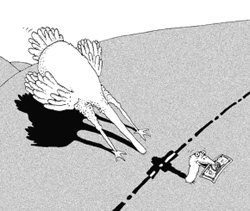Some 7 million Ukrainians live abroad

Emigration is underway in almost every country. ГmigrОs from the East come to Ukraine to find jobs, while Ukrainians travel west for the same purpose. In Western Ukraine emigration has acquired a scope akin to an epidemic. Almost half the families in Zakarpattia, Ivano-Frankivsk, Lviv, and Chernivtsi oblasts have relatives working abroad. No one in Ukraine knows exactly how many nationals stay abroad. Shocking statistics were cited on the television program “Double Evidence” two weeks ago. Between 2 and 7 million Ukrainians are currently outside this country, either as seasonal workers or settled as permanent residents. The government knows next to nothing about them. The Day asked Ihor Vynnychenko, director of the Institute for Studies of the Diaspora, to comment on the situation.
Vynnychenko: Every fourth person leaving Ukraine is a potential immigrant. In other words, these people are prepared to stay abroad and, if possible, bring the rest of the family there. The largest numbers of Ukrainians are headed for Portugal, Spain, Italy, and Russia.
The Day : Does your institute help such Ukrainians adapt to the strange environment? Is such help necessary?
Our institute is not meant to help Ukrainians emigrate. Our task is to study various aspects of Ukrainian immigration history and the current status of ethnic Ukrainian communities.
This is what we are trying to do, despite our status as a volunteer organization.
People leaving Ukraine obviously need help. First, they need information. They want to find a better living abroad, so they need some idea about what to expect, where to look for guidance and assistance. With these ideas in mind, our institute has prepared and published several reference sources over the past five years, concerning ethnic Ukrainian public and benevolent organizations in almost 40 countries. Regrettably, the print run is small. This year we plan to issue an almanac entitled, “Ukrainians Abroad in 2003.” It largely relies on data borrowed from some thirty Ukrainian magazines we receive from twelve countries, including Canada and Australia.
Since 1999 the institute has held the international festival Nashoho Tsvitu — po Vsiomu Svitu (The Cream of the Nation Across the World) with regular round table discussions. Last August we organized the most recent with the Ukrayina-Svit Society. We called it “The Fourth Emigration Wave: Regional Specifics.” It resulted in the appearance of a collection of data, including commentators’ remarks. We forwarded some 300 copies to all libraries of Kyiv, numerous volunteer organizations, local authorities, and ethnic Ukrainian communities in other countries.
Do you have any statistics on young Ukrainians traveling abroad to study and then staying there for good?
First, Ukraine’s student exchange program is not doing well, primarily because of inadequate information and lack of funds.
Students now travel abroad to earn a living. Young promising scientists also leave Ukraine to get jobs in line with their qualifications. They can’t do so here. It is a sad situation, but the process continues unabated. During the decade of independence, Ukraine has lost thousands of talented citizens that would have sure served its benefit.
What is the goal of those traveling abroad with a post-secondary education?
It depends. Anyway, a lot of specialists with academic degrees work as cabbies, nurses, you name it. That way they can support their families, send their children to school, and even help relatives remaining in Ukraine.
What kind of relationships are maintained between the Diaspora and Ukraine: cultural, economic, and so on?
The old Diaspora tries to use every occasion to help Ukraine through organizations such as the United Ukrainian American Benevolent Committee, Ukrainian American Women’s Association, World Ukrainian Congress, and other volunteer organizations collecting sizable sums and trying to provide target-oriented aid. Ethnic Ukrainian performing groups take part in various cultural events here. We also have other contacts, but they all would be considerably more effective if Ukraine showed a proper attitude to its fellow countrymen living abroad. It suffices to remind oneself that the Verkhovna Rada has for a number of years been unable to pass the bill entitled, “On the Ukrainians Abroad.”
Who do you think is most interested in contacts with the Diaspora?
Ukraine, first and foremost. There are many ethnic Ukrainians holding important political and governmental posts, and running big businesses. It is a potential Ukrainian lobby. Even lacking attention on the part of their historical home country, they try to serve the benefit of the Ukrainian government and help its international prestige. Official Kyiv, however, remembers some of them only on official occasions. For example, it recognized the World Ukrainian Forum.
Ukrainians living in young democracies, post-Soviet and postsocialist countries, need help from the land of their ancestors, not money, but moral support. Nevertheless, Ukrainian dignitaries visiting such countries in their official capacity sometimes “forget” to meet with ethnic Ukrainian communities, despite previous arrangements. Also, they do not seem to notice any problems existing in unorganized Ukrainian communities, so they don’t do what they should do. Likewise, the national program entitled, “Ukrainians Abroad for a Period until the Year 2005,” adopted by the President of Ukraine in September 2001, remains only a paper project. It is not adequately financed and lacks a coordinating body that would manage what funds are available and arrange for help for our fellow countrymen abroad. This kind of assistance is now scattered among a number of agencies and organizations: the Nationalities and Migration State Committee, Foreign Ministry, Ministry of Education and Science, Ministry of Culture and Art, Ukrayina-Svit Society, Prosvita, and the Ukrainian World Coordinating Council.
The official attitude regarding emigrants must include a clear concept of the problem and an attempt to solve it painlessly and for the benefit of all concerned. The government must recognize people who were forced decades ago to leave their homes, as well as to those having to do so now, and seek a better living elsewhere, both current and future generations. Regrettably, we lack this atti tude.
Newspaper output №:
№5, (2003)Section
Society





